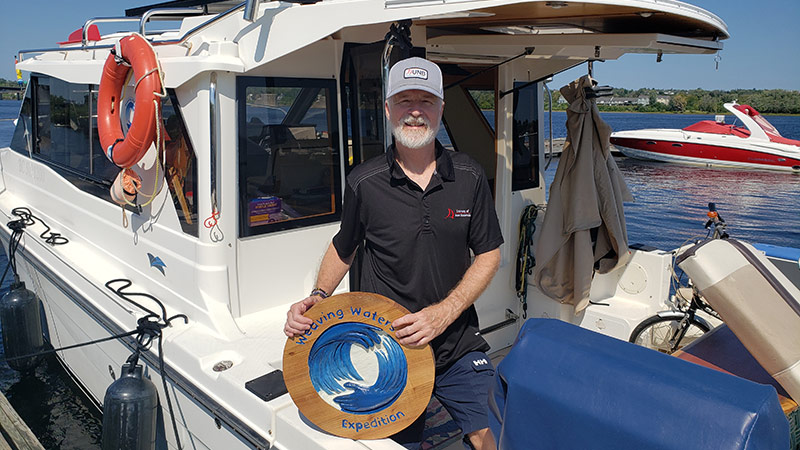Story stream: UNB professor completes 414-day waterway research odyssey
Author: Tim Jaques
Posted on Sep 19, 2024
Category: UNB Fredericton , Faculty of Science

After 414 days and nearly 5,000 nautical miles in search of stories on the waterways of eastern North America, Dr. Allen Curry is back in Fredericton.
"Every time I pulled into a dock, someone wanted to talk," said Curry, a professor at the Canadian Rivers Institute and the faculties of forestry and environmental management and science at the University of New Brunswick (UNB).
"They would tell me about the changes they've seen — not always for the better — in the water quality, the shorelines, the fishing, even the ability simply to enjoy being on the water."
Curry embarked on his Weaving Waters Expedition on July 16, 2023, on a 30-foot Cutwater boat named Water Weaver. He was partly inspired by Rachel Carson’s landmark 1962 book Silent Spring, a study of the harmful effects of human-made chemicals on the environment.
That decade, heavy industrial pollution caused the Cuyahoga River in Cleveland and the Rouge River in Detroit to catch fire. Those fires and Carson’s book helped spur the modern environmental movement, leading to comprehensive regulations to reduce pollution in the United States and Canada.
Curry plans to document the current state of waterways using science combined with local knowledge. To get that local knowledge, he needed to talk to people. After the boat was trucked from British Columbia, Curry sailed Water Weaver from Stoney Creek on Lake Ontario near Hamilton through the Great Lakes to Chicago, then south on the Illinois, Mississippi and Tennessee river systems, reaching saltwater at Mobile, Ala.
He stopped in many states and the Bahamas, eventually boating back via the Hudson River and Erie Canal to Lake Ontario and finally down the St. Lawrence River to Quebec City.
He had planned to boat to the Gulf of St. Lawrence, along Gaspesia and the New Brunswick coast, then around Nova Scotia to Saint John and Fredericton. The loss of an engine in the Bahamas caused a six-week delay that required trucking Water Weaver to Saint John to avoid seasonal rough seas on his own. He then boated upriver to Fredericton’s Capital City Boat Club.
Despite the shortened voyage, he gathered stories and maintained a trip blog.
One common thread he heard was that while progress has been made in cleaning polluted waterways since stricter regulations came into force in the 1970s, there is still more to do.
"You see this trend where things were really bad post-World War II and then they got better when the regulations came into play in the 1970s to today," Curry said.
"But then there's sort of a plateau, and in some places, even a decline again. The regulations helped make that initial jump, but they just haven't been enough to keep pushing things to an even better level of healthy environments."
Curry said people are unhappy about industries’ impact on their local waterways.
“The residual pollution and spills are still having an effect, even if it's not as bad as it once was,” he said, noting concerns about water quality and fishing.
“Sometimes I arranged to meet people, such as scientists or NGOs or just local people. But when you arrive at a dock and tell people what you are doing, they want to tell you their stories.”
He found beauty along the way, in Georgian Bay on Lake Huron, the Tennessee River, the islands in the Gulf of Mexico and the Bahamas. But some places were crowded or heavily industrialized.
“You get into some places like Miami or Fort Lauderdale, overrun by people, boats and houses. It is crazy,” said Curry.
“You can see the water quality is bad. People are boating, but they are unhappy because there are so many of them, and they are constantly fighting on the water. In some of the big marinas, they are pretty polluted because you have a thousand boats inside an enclosed area and all the residual stuff that comes off a boat.”
He remembers good things, such as meeting a group on the Mississippi who hunt for historical artifacts along its banks. Curry also heard stories of hope and revitalization, particularly in areas where communities made concerted efforts to reconnect with the water.
He saw how thoughtful redevelopment can revitalize a community’s relationship with its rivers, lakes and waterfronts.
"When you're down by the water, you start to develop that water ethic," Curry said. "You realize you're not separate from the environment. You're a critical part of it. And that's what I'm trying to encourage – getting people to reconnect with the water around them."
The trip was challenging. No sooner had Curry started than the boat needed a new alternator and later lost the engine. He weathered rough seas. These setbacks only strengthened his resolve to carry on and share the stories he had gathered.
"I'm going to write at least one book, weaving together the local stories I heard with the scientific knowledge from my background and that of my colleagues," Curry said.
"I want to find a way to present that information in a way that resonates with people and shows them the importance of their role in protecting our water resources."
Curry, who plans to retire at the end of the year, hopes to embark on a winter speaking tour, bringing the expedition's lessons to communities across the region and inspiring others to appreciate their waterways and shorelines.
"If I can get people to pay more attention to the environment around them, then I'll call that a win," Curry said.
"We're all part of this water world and must start acting like it."
Photo: Dr. Allen Curry aboard Water Weaver.
